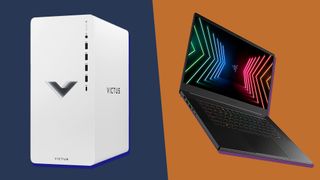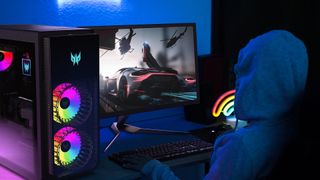Gaming PC vs gaming laptop: which PC gaming option is better for your needs
When it comes to a gaming PC vs gaming laptop, It’s all about preference

With PC Gaming being more accessible than ever, many are going to be looking at getting a new device this Black Friday thanks to all of the deals and new models going on sale with next-gen components. But whether to buy a gaming PC vs gaming laptop will be most gamers' number one question.
The best gaming PC should feature blistering power with room to push performance even further. Meanwhile, some of the best gaming laptops available balance portability with the potential for respectable visual fidelity in games.
To make the decision about which to buy a bit easier, we’re breaking down some things to consider when choosing between a gaming desktop and gaming laptop so you can make the right choice for your needs and budget.
Gaming PC vs gaming laptop: price & availability

When deciding on whether to get a gaming desktop or laptop, one should keep their budget in mind. At the lowest end of the spectrum, gaming desktops built from scratch are usually cheaper depending on how an individual gets their components.
Two years ago, building a gaming desktop that could run current-generation console quality games at 4K resolution at 60 frames-per-second would cost a small fortune. Now, a similar set-up can cost a little less than half of that if one can find some good deal on parts.
Pre-builds from manufacturers like Alienware and Origin are going to cost significantly more due to factors ranging from build design besides labor to extras like warranties. These are great for people who don’t want to think too much about their gaming desktop setup. Depending on the various options for CPU, GPU, storage, cooling and manufacture-specific features, some of these prebuilt PCs can start lower than $1,000 and skyrocket well above $6,000, especially if they come loaded with the best graphics card and best processor on the market.
Gaming laptops that are in the 4K/60fps range are usually more expensive than their desktop counterparts due to their portability. Then there are other things to consider including display resolution, refresh rates, battery life and warranties as well. Many of these options are customizable depending on the manufacture as well which could help in cost.
- Winner: Tie
Gaming PC vs gaming laptop: Design

PC gaming is all about personal customization. This extends to both desktop and laptop gaming on Windows. The idea of functionality when making the decision really comes down to gaming needs.
Due to the stationary nature of desktops, functionality is essentially limitless. Prebuild or building one from the ground up really allows a high level of personalization. There are dozens of design factors to choose from when thinking about a desktop chassis alone. Once the internal components are out of the way, accessories from monitors to input devices drives that point further.
Laptops offer more than just portability but, an all in one solution when trying to game on the go. Gamers who travel a lot may appreciate these more compact devices. With most gaming laptops offering HDMI ports, it’s also easy to get games set-up on a hotel television in addition to input devices like a controller or mouse and keyboard.
When travelling on a plane or when not gaming, there are other task that can be done such as general word processing or video and photo editing. Higher end gaming laptops feature touch screen and stylus pen support for graphic designers or artist as well.
- Winner: Tie
Gaming PC vs gaming laptop: Performance

Individuals who want absolute power and high visual fidelity are going to get their best experiences through a desktop. That’s because the latest CPU and GPU releases are usually made with them in mind first. Laptop versions of those chipsets usually come a bit later down the line.
Though the NVIDIA RTX 40-series line of GPUs has been released, a laptop version isn’t available yet. Performance tuning options like overclocking require better cooling capabilities like several bigger fans or liquid cooling options which aren’t available on gaming laptops yet. You can always use a laptop cooling pad, at least.
That doesn’t mean that laptops can’t pull off fantastic gaming performance as devices including the Lenovo Legion 7, Corsair Voyager a1600, or Alienware X14 are very powerful. These laptops can easily run AAA titles like Cyberpunk 2077, Doom Eternal, Forza Horizon 5, Call of Duty: Modern Warfare, and more at high resolution with max settings while maintaining high frame rates.
- Winner: Gaming PCs
Gaming PC vs gaming laptop: Portability

When it comes to portability, there is a very clear winner. Even with smaller, mini gaming PCs on the market like the Intel NUC and others, they don't provide an all-on-one gaming solution the way a gaming laptop does.
And while gaming laptops can easily be desktop PC replacements thanks to powerful internal hardware and the ability to output to a gaming monitor, it doesn't work the other way around, and so traveling with a gaming PC is always going to be a non-sensical option.
- Winner: Gaming laptops
Gaming PC vs gaming laptop: Upgradability
Outside of possibly SSD storage and RAM modules, most gaming laptops aren’t upgradeable for obvious reasons. The internal components are usually soldered together and not slot-driven like their desktop counterparts. This means buyers are going to have to upgrade their laptops once every three to four years to match evolving system requirements for the top-tier AAA games.
On the other hand, gaming desktops are made to be upgraded in every way over time including CPU, GPU, RAM, storage and cooling among others. This doesn’t even count other accessory-based upgrades from display to input controls.
- Winner: Gaming PCs
Gaming PC vs gaming laptop: Which should you buy?

PC gamers debating whether to buy a gaming PC vs gaming laptop should understand what they’re looking for in their gaming experience.
If the only things that matter are high-end visuals and performance then a desktop is probably best. You'll be able to upgrade it to keep pace with the latest games and customize much of it to your personal tastes. Gamers who want a portable machine that they can game on may want to look into a laptop for obvious reasons. Yes, you'll be sacrificing some performance, but you'd still be amazed what you can do with a gaming laptop and you get the benefit of an all-in-one gaming device.
Between those choices come other considerations like resolution and performance preference alongside the feature set, not to mention budget, but the fundamental question is between top performance and portability. Everything else should stem from there.
Get daily insight, inspiration and deals in your inbox
Get the hottest deals available in your inbox plus news, reviews, opinion, analysis and more from the TechRadar team.
Ural Garrett is an Inglewood, CA-based journalist and content curator. His byline has been featured in outlets including CNN, MTVNews, Complex, TechRadar, BET, The Hollywood Reporter and more.

